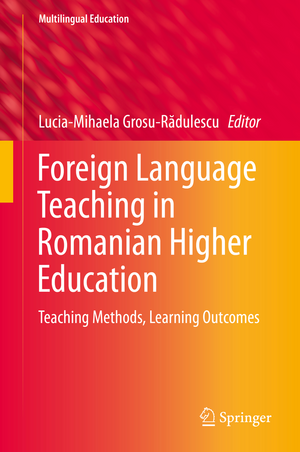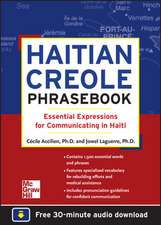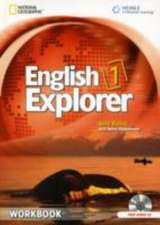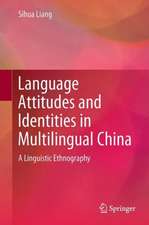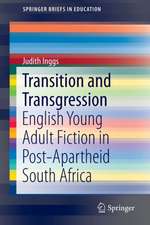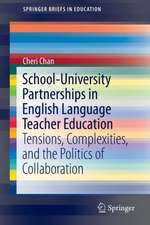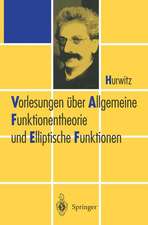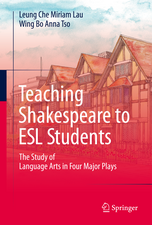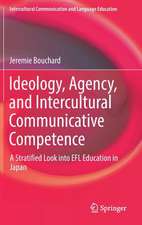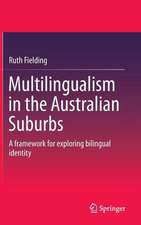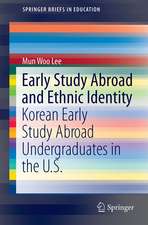Foreign Language Teaching in Romanian Higher Education: Teaching Methods, Learning Outcomes: Multilingual Education, cartea 27
Editat de Lucia-Mihaela Grosu-Rădulescuen Limba Engleză Hardback – 27 aug 2018
The contributing authors approach their respective chapters relying on both qualitative and quantitative research. Their experience and conclusions will prove helpful for any foreign language professional working in tertiary education.
| Toate formatele și edițiile | Preț | Express |
|---|---|---|
| Paperback (1) | 642.83 lei 6-8 săpt. | |
| Springer International Publishing – feb 2019 | 642.83 lei 6-8 săpt. | |
| Hardback (1) | 649.22 lei 6-8 săpt. | |
| Springer International Publishing – 27 aug 2018 | 649.22 lei 6-8 săpt. |
Din seria Multilingual Education
- 18%
 Preț: 902.36 lei
Preț: 902.36 lei - 18%
 Preț: 956.81 lei
Preț: 956.81 lei - 18%
 Preț: 953.65 lei
Preț: 953.65 lei - 18%
 Preț: 836.29 lei
Preț: 836.29 lei - 15%
 Preț: 638.24 lei
Preț: 638.24 lei - 20%
 Preț: 567.32 lei
Preț: 567.32 lei - 20%
 Preț: 566.75 lei
Preț: 566.75 lei - 20%
 Preț: 569.85 lei
Preț: 569.85 lei - 15%
 Preț: 649.87 lei
Preț: 649.87 lei - 15%
 Preț: 645.28 lei
Preț: 645.28 lei -
 Preț: 394.87 lei
Preț: 394.87 lei - 15%
 Preț: 643.84 lei
Preț: 643.84 lei - 15%
 Preț: 643.34 lei
Preț: 643.34 lei -
 Preț: 389.49 lei
Preț: 389.49 lei - 15%
 Preț: 704.36 lei
Preț: 704.36 lei - 20%
 Preț: 555.52 lei
Preț: 555.52 lei - 18%
 Preț: 953.65 lei
Preț: 953.65 lei - 18%
 Preț: 952.26 lei
Preț: 952.26 lei - 15%
 Preț: 646.43 lei
Preț: 646.43 lei - 15%
 Preț: 585.40 lei
Preț: 585.40 lei - 18%
 Preț: 787.15 lei
Preț: 787.15 lei - 18%
 Preț: 1009.22 lei
Preț: 1009.22 lei - 18%
 Preț: 948.92 lei
Preț: 948.92 lei - 18%
 Preț: 1113.39 lei
Preț: 1113.39 lei - 15%
 Preț: 644.95 lei
Preț: 644.95 lei - 15%
 Preț: 634.68 lei
Preț: 634.68 lei - 15%
 Preț: 644.63 lei
Preț: 644.63 lei -
 Preț: 388.90 lei
Preț: 388.90 lei - 15%
 Preț: 647.27 lei
Preț: 647.27 lei - 15%
 Preț: 641.85 lei
Preț: 641.85 lei - 15%
 Preț: 635.80 lei
Preț: 635.80 lei
Preț: 649.22 lei
Preț vechi: 763.78 lei
-15% Nou
124.22€ • 129.70$ • 102.81£
Carte tipărită la comandă
Livrare economică 05-19 aprilie
Specificații
ISBN-10: 3319933280
Pagini: 310
Ilustrații: XII, 334 p. 15 illus.
Dimensiuni: 155 x 235 mm
Greutate: 0.66 kg
Ediția:1st ed. 2018
Editura: Springer International Publishing
Colecția Springer
Seria Multilingual Education
Locul publicării:Cham, Switzerland
Cuprins
Foreword.- PART I: Foreign Language Education in Romania – Contexts and Methodologies.- Constructing and construing the place of Romanian foreign language education in the European context (Lucia-Mihaela Grosu-Rădulescu).- Laying the foundation of foreign language acquisition – the cases of educational policies and English textbook design (Mihaela Badea, Mihaela Suditu and Diana Presadă).- On some of the challenges of teaching formal English linguistics (Maria Aurelia Cotfas).- The importance of visual literacy: an analysis of potential obstacles for Romanian students in the completion of IELTS Academic Writing Task 1 (Marina-Cristiana Rotaru).- The impact of the CEFR on teaching and assessing Romanian as a second/ foreign language. Practice and research (Ioana-Silvia Sonea).- Teaching Romanian as a foreign language. Formal and non-formal education perspectives (Roxana-Magdalena Bârlea).- MedLang MOOC—an innovative palliative care learning tool. Innovative approaches and teaching methodologies (Anca Colibaba, Claudia Dinu, Irina Gheorghiu and Stefan Colibaba).- Personal epistemology: a “Dark Matter” that matters in how we teach and learn languages at university (Ioana Crețu).- The experience of writing a co-narrative: story-building in Japanese language teaching (Raluca Nicolae).- PART II: Beyond Language Learning – Student Motivation and Autonomy and New Roles for Teachers.- Students’ motivation to learn foreign languages in tertiary education (Gabriela Chefneux).- The English language as a tool for self-development among Romanian students – A case study at the Bucharest University of Economic Studies (Irina David).- Fostering learner autonomy in Japanese language classes (Magdalena Ciubăncan).- Education for democratic citizenship through English. A challenge for academia (Roxana-Elisabeta Marinescu).- Professional ethics and moral education in the medical language curriculum – Can it be done? (Ioana Crețu).- New roles for language teachers in higher education. A collaborative perspective of language and content teachers’ views (Valentina Robu and Laura-Mihaela Muresan)
Textul de pe ultima copertă
This volume gathers recent research findings in the field of foreign language (FL) teaching in Romanian higher education dwelling on both methodology and students’ learning outcomes. The book satisfies the need for an up-to-date overview of FL teaching in Romanian universities in the European context as well as from a global international perspective. This book confers visibility to Romanian foreign language scholars’ research and it opens new paths for debate and collaboration worldwide. The scholars included in this volume have extensive expertise in the field of foreign language teaching and research in higher education which is supported by their international recognition as specialists in their specific areas. The contributing authors approach their respective chapters relying on both qualitative and quantitative research. Their experience and conclusions will prove helpful for any foreign language professional working in tertiary education.
Caracteristici
Descriere
This volume gathers recent research findings in the field of foreign language (FL) teaching in Romanian higher education dwelling on both methodology and students’ learning outcomes. The book satisfies the need for an up-to-date overview of FL teaching in Romanian universities in the European context as well as from a global international perspective. This book confers visibility to Romanian foreign language scholars’ research and it opens new paths for debate and collaboration worldwide. The scholars included in this volume have extensive expertise in the field of foreign language teaching and research in higher education which is supported by their international recognition as specialists in their specific areas.
The contributing authors approach their respective chapters relying on both qualitative and quantitative research. Their experience and conclusions will prove helpful for any foreign language professional working in tertiary education.
